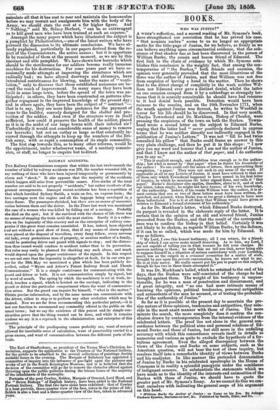nanwev um:Duras.
THE Railway Commissioners compute that within the last twelvemonth the number of killed by railway accidents was 276, the number wounded 556, to say nothing of those who have been injured temporarily or permanently by alarm and "shock." It also appears that the majority of the accidents which happen still arise from preventible causes. Five-sixths of the total number are said to be not properly "accidents," but rather incidents of the present arrangements. Amongst recent accidents has been a repetition of that which horrified Sydney Smith, a train on fire, an express train ; the two carriages next the engine and all the luggage being enveloped in, a fierce flame. The passengers shrieked, but there was no means of communi- cation between them and the driver. In the Times last week was mentioned the case of a woman who was killed by falling out of a carriage. Probably she died on the spot; but if she survived with the chance of life there was no means of stopping the train until the next station. Surely it is a reflec- tion on the ingenuity of this country and on the enterprise of railway com- panies if this great want remains unsatisfied. It has, indeed, been objected and not without a good show of force, that if any means of alarm signals were placed at the disposal of travellers, every fussy fellow, every nervous old lady, every pretentious man of property, or anxious mother of a family, would be pestering driver and guard with signals to stop ; and the distrac- tion thus caused would conduce to accident rather than to its prevention. But rules may easily be planned for checking any such abuse, and much would depend upon the proper contrivance of the signals. In this respect we are not sure that the ingenuity is altogether at fault, for in our own pa- per for the 28th May we mentioned a plan which has been publicly de- scribed, called "Myers and Askew's Patent Railway Break and Phonic Communicator." It is a simple contrivance for communicating with the guard and driver or both. It is not communication simply by signal, but by word of mouth. The spring by which the machinery is set at work, in- deed, touches a signal, which is hoisted on the carriage, indicating to the guard or driver the particular compartment where the want of communica- tion arises. But the guard can inquire for himself, "what is the matter." Obtain precise information, and by the same means can communicate with the driver, either to stop or to perform any other evolution which may be desired. Now we are far from recommending this particular patent,—it is not our function to recommend any commodity offered to the public on the usual terms ; but we say the existence of this patent and its simple con- struction prove that the thing wanted can be done, and while it remains undone we say it is a reproach to the administration and enterprise of this country.
The principle of the predisposing causes probably are, want of margin allowed for inevitable error of calculation, want of punctuality carried to a gross excess, and want of communication between the different parts of the train.
























 Previous page
Previous page